Hello everyone! For those of you that don’t know me my name is Natalie Duo, and I am a young woman with a
learning disability
 A learning disability is to do with the way someone's brain works. It makes it harder for someone to learn, understand or do things.
who previously did a Supported Internship with Mencap.
A learning disability is to do with the way someone's brain works. It makes it harder for someone to learn, understand or do things.
who previously did a Supported Internship with Mencap.
I now work at Mencap delivering learning disability awareness training to employers we work with. I am also a keen writer and like to
interview
 An interview is a meeting where you talk to someone or a group of people about something. When you have an interview for a job, you have to answer questions and say why you would be good at the job. The person who gives the best answers is offered the job.
employers to understand how they support people with a learning disability in the workplace and why it’s important to them.
An interview is a meeting where you talk to someone or a group of people about something. When you have an interview for a job, you have to answer questions and say why you would be good at the job. The person who gives the best answers is offered the job.
employers to understand how they support people with a learning disability in the workplace and why it’s important to them.
My latest interview is a special one for me. It’s with Jacqui Dobson,
Diversity
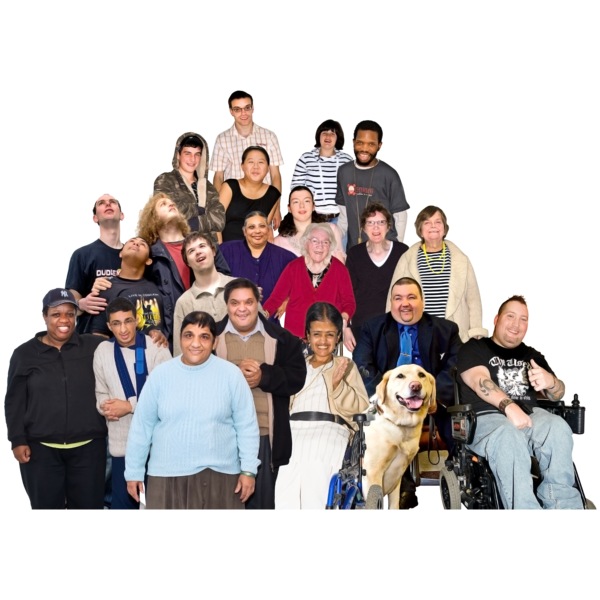 Diversity means people from all different cultures and backgrounds.
and Inclusion Partner at The Financial Times who I worked with when I did
work experience
Diversity means people from all different cultures and backgrounds.
and Inclusion Partner at The Financial Times who I worked with when I did
work experience
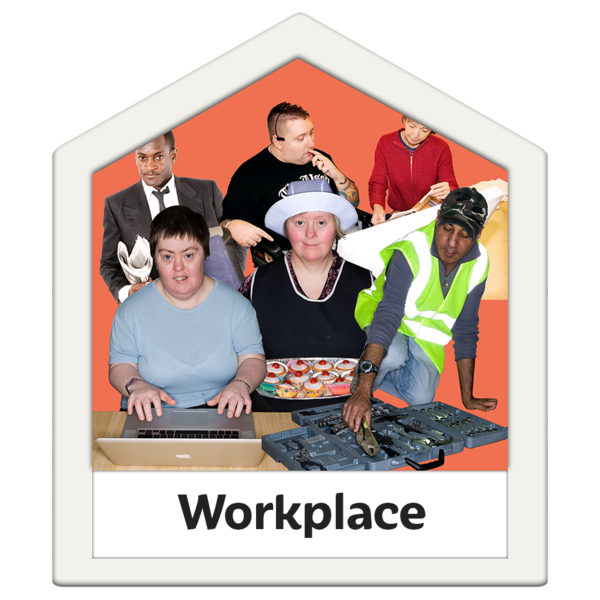 Work experience is when you try out a job to help you learn new skills.
in the company’s admin team as part of my Supported Internship. I hope you enjoy reading my interview.
Work experience is when you try out a job to help you learn new skills.
in the company’s admin team as part of my Supported Internship. I hope you enjoy reading my interview.
Natalie: How did you come to start working with Mencap?
Jacqui: I first started working with Mencap a long time ago. I’d had previous experience of working with people with a learning disability before I was at The Financial Times and was working at another news
organisation
 An organisation are a group of people who work together.
.
An organisation are a group of people who work together.
.
A young person with a learning disability came to do work experience with us and I really enjoyed working with him and he was very skilled and good at his job. Even before that I was very aware of how people with a learning disability could do well in the workplace.
My aunt worked in a job supporting people with a learning disability into work so from a young age I learnt about all the things people could achieve given the right environment.
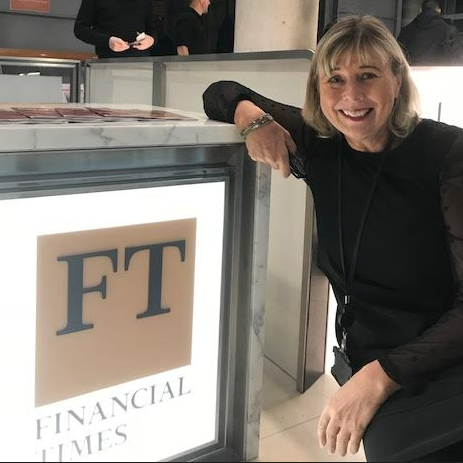
Jacqui Dobson, Diversity and Inclusion Partner at The Financial Times
So, when I came to start working on organising work experience programmes at The Financial Times it seemed only natural to me that we should engage people with a learning disability. We work with lots of organisations that support people from groups that are under-represented in the workplace.
For example, we work with The Thomas Pocklington Trust to engage people with sight loss, and with The Taylor Bennett Foundation who help young people from Black, Asian and minority ethnic backgrounds to pursue careers in communications. And to engage people with a learning disability we reached out to Mencap.
Everyone at Mencap is so lovely and we soon had somebody come in and talk to us and we did a whole awareness raising
campaign
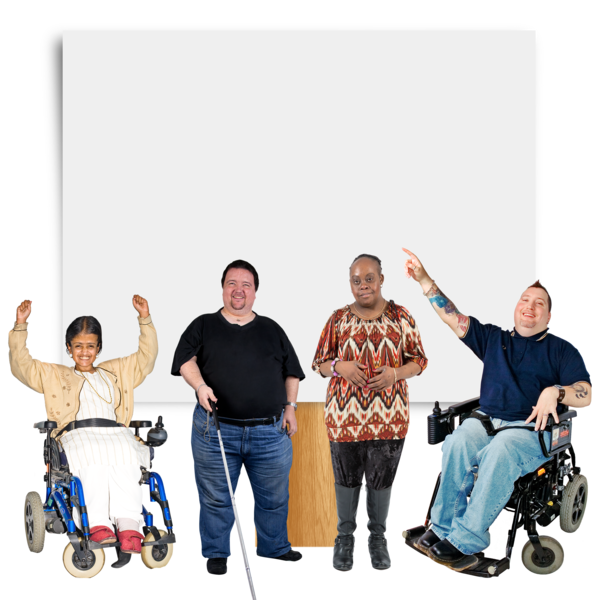 A campaign is when people work together to try to change something.
around learning disability. Then we started regularly welcoming learners on the Supported Internship programme soon after that.
A campaign is when people work together to try to change something.
around learning disability. Then we started regularly welcoming learners on the Supported Internship programme soon after that.
How many people have you worked with and how have you supported them?
We must have had about thirty to forty people from Mencap come through our doors over the years, if not more. We support them in lots of different ways. Some have done work experience and have even ended up working for The FT full-time. Some of them have come to us in groups and we’ve delivered workshops to them about what we do.
Our relationship with Mencap has developed to the point where we now have a mutual understanding which I really love. Some of the programmes that I offer, for example, might be slightly outside of what Mencap usually does. But they see the value for the young people on their programme and so they work to tailor their programme a bit to ours.
I absolutely trust their judgment regarding which of their learners they think are best suited to our opportunities at The FT and who will get the most out of them. They’re bringing along and who is going to get the best out of these kinds of things.
The relationship between our two organisations is now at a point where either of us can pick up the phone and say, “hey, can you help me with this?”, or “is there anything we can do around that?”, and then we'll work together to make it happen.
How have Mencap helped you to support people with a learning disability in the workplace?
Mencap are really good at recognising that everyone is an individual and everyone has different needs. They keep me informed as to the kind of support that someone will need to help me be able to include them in conversations and offer each young person the right level of work experience as well, so it’s individually tailored support.
Sometimes the tailored nature of that support might mean that Mencap don’t need to provide much help at all, as it’s about enabling the young person to become independent and we get to sit back and watch them thrive in a new environment. Others need more side-by-side support to help interpret instructions, provide help with tasks and reassurance.
What are you most proud of about working with Mencap?
I’m proud of so many things. I’m proud that you came and worked for us, Nat. I remember, for example, when we spoke to the council in front of all those people. That was your first ever speaking opportunity and I don’t know who was more nervous, you or me. But the crowd really got behind you and you carried it off so well. It was amazing and I was really proud that we had something to do with that.
I'm also proud of all the adverts about Mencap that The FT have placed in the paper. Whenever I see a Mencap advert there and I see the face of a young person who I recognise talking about what they're doing, I really love that.
I'm also proud when we actually employ someone that came through on the Supported Internship. Some of those people are doing better in their roles than anyone else before them!
I find things to be proud of every day working with Mencap. We had a group come into the office this week, for example, who were quite shy and not really engaged at first. They were with me for two hours during which time we did some brainstorming about ideas for a business and at the end they split in to two groups and gave quick presentations about their ideas. And what they came up with was so amazing, especially considering how uncertain they’d been at the start.
Lastly, I’m just really proud that the organisation I work with wants to be connected to Mencap and wants to promote it. Our partnership is a really good collaboration of two really good brands.
If your business would like to partner with Mencap and support people with a learning disability to get into
employment
 Employment means having a job.
, please email employer.engagement@mencap.org.uk or look at the employment pages on our website.
Employment means having a job.
, please email employer.engagement@mencap.org.uk or look at the employment pages on our website.

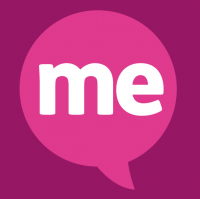 By Mencap
By Mencap